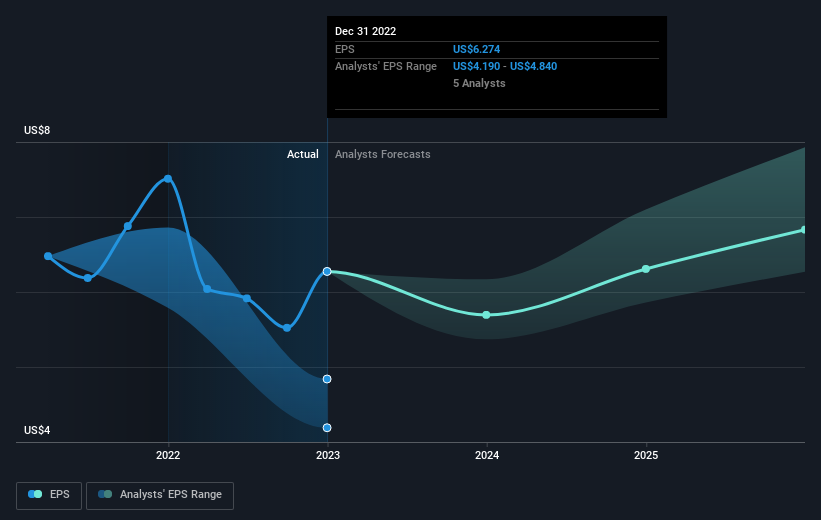Investors one-year losses continue as Essex Property Trust (NYSE:ESS) dips a further 8.8% this week, earnings continue to decline
Passive investing in an index fund is a good way to ensure your own returns roughly match the overall market. Active investors aim to buy stocks that vastly outperform the market - but in the process, they risk under-performance. That downside risk was realized by Essex Property Trust, Inc. (NYSE:ESS) shareholders over the last year, as the share price declined 36%. That's well below the market decline of 7.3%. At least the damage isn't so bad if you look at the last three years, since the stock is down 4.3% in that time. On top of that, the share price is down 8.8% in the last week. However, this move may have been influenced by the broader market, which fell 5.3% in that time.
If the past week is anything to go by, investor sentiment for Essex Property Trust isn't positive, so let's see if there's a mismatch between fundamentals and the share price.
See our latest analysis for Essex Property Trust
While the efficient markets hypothesis continues to be taught by some, it has been proven that markets are over-reactive dynamic systems, and investors are not always rational. By comparing earnings per share (EPS) and share price changes over time, we can get a feel for how investor attitudes to a company have morphed over time.
Unfortunately Essex Property Trust reported an EPS drop of 16% for the last year. This reduction in EPS is not as bad as the 36% share price fall. Unsurprisingly, given the lack of EPS growth, the market seems to be more cautious about the stock.
You can see how EPS has changed over time in the image below (click on the chart to see the exact values).
We consider it positive that insiders have made significant purchases in the last year. Even so, future earnings will be far more important to whether current shareholders make money. Dive deeper into the earnings by checking this interactive graph of Essex Property Trust's earnings, revenue and cash flow.
What About Dividends?
It is important to consider the total shareholder return, as well as the share price return, for any given stock. The TSR incorporates the value of any spin-offs or discounted capital raisings, along with any dividends, based on the assumption that the dividends are reinvested. So for companies that pay a generous dividend, the TSR is often a lot higher than the share price return. In the case of Essex Property Trust, it has a TSR of -34% for the last 1 year. That exceeds its share price return that we previously mentioned. And there's no prize for guessing that the dividend payments largely explain the divergence!
A Different Perspective
While the broader market lost about 7.3% in the twelve months, Essex Property Trust shareholders did even worse, losing 34% (even including dividends). Having said that, it's inevitable that some stocks will be oversold in a falling market. The key is to keep your eyes on the fundamental developments. Longer term investors wouldn't be so upset, since they would have made 0.6%, each year, over five years. It could be that the recent sell-off is an opportunity, so it may be worth checking the fundamental data for signs of a long term growth trend. It's always interesting to track share price performance over the longer term. But to understand Essex Property Trust better, we need to consider many other factors. Case in point: We've spotted 2 warning signs for Essex Property Trust you should be aware of, and 1 of them doesn't sit too well with us.
Essex Property Trust is not the only stock insiders are buying. So take a peek at this free list of growing companies with insider buying.
Please note, the market returns quoted in this article reflect the market weighted average returns of stocks that currently trade on US exchanges.
Have feedback on this article? Concerned about the content? Get in touch with us directly. Alternatively, email editorial-team (at) simplywallst.com.
This article by Simply Wall St is general in nature. We provide commentary based on historical data and analyst forecasts only using an unbiased methodology and our articles are not intended to be financial advice. It does not constitute a recommendation to buy or sell any stock, and does not take account of your objectives, or your financial situation. We aim to bring you long-term focused analysis driven by fundamental data. Note that our analysis may not factor in the latest price-sensitive company announcements or qualitative material. Simply Wall St has no position in any stocks mentioned.
Join A Paid User Research Session
You’ll receive a US$30 Amazon Gift card for 1 hour of your time while helping us build better investing tools for the individual investors like yourself. Sign up here

 Yahoo Finance
Yahoo Finance 
